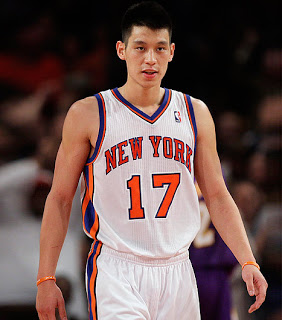 In our on going effort to bring to you articles that examine New York Knicks guard Jeremy Lin through the lens of Rhetoric Race and Religion, we share with our readers the column of David Brooks titled, “The Jeremy Lin Problem.” Needless to say, the column provoked many to offer a response and we share them with you as well. Enjoy
In our on going effort to bring to you articles that examine New York Knicks guard Jeremy Lin through the lens of Rhetoric Race and Religion, we share with our readers the column of David Brooks titled, “The Jeremy Lin Problem.” Needless to say, the column provoked many to offer a response and we share them with you as well. Enjoy
The Jeremy Lin Problem
by David Brooks
New York Times
Jeremy Lin is anomalous in all sorts of ways. He’s a Harvard grad in the N.B.A., an Asian-American man in professional sports. But we shouldn’t neglect the biggest anomaly. He’s a religious person in professional sports.
We’ve become accustomed to the faith-driven athlete and coach, from Billy Sunday to Tim Tebow. But we shouldn’t forget how problematic this is. The moral ethos of sport is in tension with the moral ethos of faith, whether Jewish, Christian or Muslim.
The moral universe of modern sport is oriented around victory and supremacy. The sports hero tries to perform great deeds in order to win glory and fame. It doesn’t really matter whether he has good intentions. His job is to beat his opponents and avoid the oblivion that goes with defeat.
Read the rest here
Jeremy Lin poses a problem for New York Times columnist David Brooks
By Melissa Bell
Washington Post
It seems no one can get enough of basketball star Jeremy Lin, including journalists and pundits. The saturation media coverage of so-called Linsanity has extended to New York tabloids, Time magazine covers — and now New York Times columnists. Unfortunately, not everyone likes the angles the media are taking to get in on the Knicks player’s aura.
David Brooks, a Times columnist, wrote an op-ed column about a side of Lin that isn’t much in the public discourse: his religion.
The column, titled “The Jeremy Lin Problem,” opens with this:
“Jeremy Lin is anomalous in all sorts of ways. He’s a Harvard grad in the N.B.A., an Asian-American man in professional sports. But we shouldn’t neglect the biggest anomaly. He’s a religious person in professional sports.”
As sports fans know, religion in sports is as much an anomaly as team jerseys are. In an attempt to tackle the well-covered story of Lin, Brooks chose an angle that was inherently flawed. Athletes and religion are often inextricably linked.
Read the rest here
Jeremy Lin, Religious Values, and the “Moral Ethos of Sport”
by Charles Camosy
David Brooks is becoming must-readable these days.
Yesterday he had a column in the New York Times which, invoking the Harvard-grad and budding Asian-American NBA superstar Jeremy Lin, made the bold claim that, “The moral ethos of sport is in tension with the moral ethos of faith, whether Jewish, Christian or Muslim.” You see, Jeremy Lin is trying to be explicitly religious while he climbs to NBA stardom. But Brooks says:
The moral universe of modern sport is oriented around victory and supremacy. The sports hero tries to perform great deeds in order to win glory and fame. It doesn’t really matter whether he has good intentions. His job is to beat his opponents and avoid the oblivion that goes with defeat.
The modern sports hero is competitive and ambitious. (Let’s say he’s a man, though these traits apply to female athletes as well). He is theatrical. He puts himself on display.
He is assertive, proud and intimidating. He makes himself the center of attention when the game is on the line. His identity is built around his prowess. His achievement is measured by how much he can elicit the admiration of other people — the roar of the crowd and the respect of ESPN.
For Brooks, this is in conflict with this religious ethos on many levels, which “is about redemption, self-abnegation and surrender to God.”
I have suggested elsewhere that the violence built into sports like American football might be at odds with Christian values. And though Brooks is onto something here as well, his sweeping claims about the “moral ethos of sport” are far too strong. It certainly doesn’t apply to the whole world of sport, and the world of team sports perhaps especially resists Brooks’ critique.
Read the rest here
Please Stop Using Jeremy Lin to Illustrate Your Pet Theories
by Ta-nehisi Coates
The Atlantic
If your writing file displays little interest in professional sports, Jeremy Lin is a really bad place to start. There are just too many trip-wires. From David Brooks:
Jeremy Lin is anomalous in all sorts of ways. He’s a Harvard grad in the N.B.A., an Asian-American man in professional sports. But we shouldn’t neglect the biggest anomaly. He’s a religious person in professional sports.
This is precisely backwards. The fact that Jeremy Lin is “a religious person in professional sports” may well be the least anomalous thing about him, short of him being an actual athlete. As any casual sports fan knows, America’s major sports are overrun with God-thanking, Bible-study-convening, Christ-quoting athletes.
Brooks seems to be aware of this when he says “We’ve become accustomed to the faith-driven athlete and coach,” but that directly contradicts his original point. He then goes on to argue that “the moral ethos of sport is in tension with the moral ethos of faith.” A sympathetic reading says that the point about Lin being an anomaly was poor-wording on the way to this much more substantive argument.
Read the rest here
The David Brooks Problem
by Marie Burns
Jeremy Lin is a young man who is just learning how all sorts of people will misuse and abuse him. He is well aware of some of these abuses: ethnic stereotyping has repeatedly stymied his basketball career, and racial insults have greeted his sudden stardom as a New York Knicks player. Still, Lin might be surprised at how David Brooks makes him an exemplar of the incompatibility of sports and religion. In a New York Times column titled “The Jeremy Lin Problem,” Brooks defines Lin’s “problem”: “He’s a religious person in professional sports.”
In a country where a majority of people describe themselves as religious, how is religion a particular problem for a professional athlete? Brooks explains: “The moral ethos of sport is in tension with the moral ethos of faith….” That is, he says, “the sporting ethos … violates the religious ethos on many levels.”
Really?
Brooks discusses the attributes of “the modern sports hero.” Let me just say that the term “sports hero,” generally speaking, is an oxymoron. There are a few athletes who have coincidentally overcome tremendous hardships to go on to be athletic superstars. Lance Armstrong, afflicted with cancer and at one point given little chance to live, is a good example of that kind of heroism. But whether or not he went on to become a sports star, Armstrong















